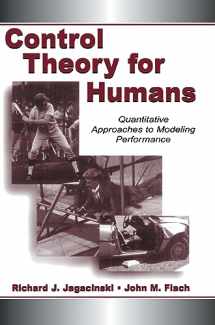
Control Theory for Humans: Quantitative Approaches To Modeling Performance
Book details
Summary
Description
This textbook provides a tutorial introduction to behavioral applications of control theory. Control theory describes the information one should be sensitive to and the pattern of influence that one should exert on a dynamic system in order to achieve a goal. As such, it is applicable to various forms of dynamic behavior. The book primarily deals with manual control (e.g., moving the cursor on a computer screen, lifting an object, hitting a ball, driving a car), both as a substantive area of study and as a useful perspective for approaching control theory. It is the experience of the authors that by imagining themselves as part of a manual control system, students are better able to learn numerous concepts in this field.
Topics include varieties of control theory, such as classical, optimal, fuzzy, adaptive, and learning control, as well as perception and decision making in dynamic contexts. The authors also discuss implications of control theory for how experiments can be conducted in the behavioral sciences. In each of these areas they have provided brief essays intended to convey key concepts that enable the reader to more easily pursue additional readings. Behavioral scientists teaching control courses will be very interested in this book.


We would LOVE it if you could help us and other readers by reviewing the book
Book review



